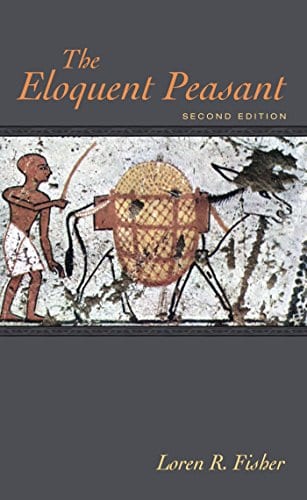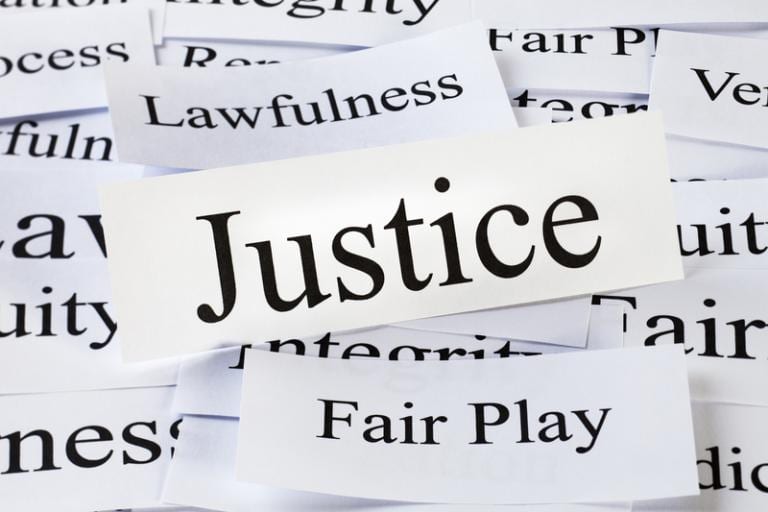Even the smallest of children echo the longings of our eloquent peasant and seek justice and truth. They know when something is unfair, when someone gets a larger portion than deserve, when the Golden Rule has been violated, when hypocrisy reigns.
I realize that most of us are not exactly into reading translations from hieroglyphic writings of ancient Egyptian morality tales, but I did do exactly that, spending several hours reading Loren R. Fisher’s translation of The Eloquent Peasant, an intriguing story of a small farmer in ancient Egypt on his way to market to sell the things he has grown and made.
With life always close to the bone, our protagonist, whom we know as the “eloquent peasant,” left his wife with just enough food to get through the days he expected to be at the market.
On the way, a thoroughly despicable character, owner of priceless riverside property, has narrowed the public path along the river and made it treacherous to traverse. The peasant’s donkey, attempting to avoid the fast-moving Nile waters, treads on the barley fields of our nefarious one. In doing so, the donkey also eats a small barley stalk.
The unscrupulous landowner then accuses the peasant of stealing from him, refuses compensation for the “theft” of the stalk of barley, and instead conscripts all of the peasant’s wares and makes them his own.
The peasant now faces death from starvation, along with the rest of his family. He has nothing to sell, nothing to trade, and no food of any kind.
This unfortunate man goes to the local authorities to plead his case. The officers were so charmed by his eloquence that they kept delaying action so he would make more appeals.
After the ninth appeal, the peasant expected both a denial of his claim and an extensive beating as punishment for bringing it. Incredibly, the authorities granted him justice: everything returned, more added to it, and the infamous character thoroughly chastised.
This satisfying end displays how justice is supposed to work–and people have known that and longed for it for thousands of years.
Our eloquent peasant seeks truth and states the Golden Rule
What particularly intrigued me in the book, however, were the constant cries for truth.
One of many examples (location 229)
Let me make your name in this land according to every good law:
A leader free from malicious greed,
A great one free from wickedness,
One who destroys falsehood,
One who creates truth,
And one who comes to the cry of him who gives voice.
Or how about this one, which is my favorite: (location 269)
He who twists speech from its accurate sense makes himself crooked from it;
Again, 4000 years ago, people knew that ripping one’s speech from accuracy, i.e., verifiable facts, makes a person crooked. And makes life unfair.
However, the issue that drove me to read this book is another phrase found in the final speech (location 582), “Do for the one who does for you.”
Many scholars acknowledge this statement as an early understanding of what many of us in the Christian world know as “The Golden Rule,” i.e., using good ol’ King James language, “Do unto others as you would have others do unto you.”
But this was hardly a new concept to Jesus. Note, for example, Leviticus 19:18 “You shall not take vengeance or bear a grudge against the sons of your own people, but you shall love your neighbor as yourself: I am the LORD.”
Another version, Leviticus 19:34 “You shall treat the stranger who sojourns with you as the native among you, and you shall love him as yourself, for you were strangers in the land of Egypt: I am the LORD your God.” (English Standard Version).
In addition, some version of the golden rule may be found in every religious and many civil traditions. Here’s one from Ancient Greece:
There are dozen of other examples. We want fairness.
Even children understand the nature of fairness
Even the smallest of children echo the longings of our eloquent peasant and seek justice and truth. They know when something is unfair, when someone gets a larger portion than deserve, when the Golden Rule has been violated, when hypocrisy reigns.
A remarkable study across cultures researching children and their understanding of fairness yielded this result:
The bottom line here is that children, even young ones, show remarkable sophistication not just in their understanding of and conformity to norms of fairness but also in their ability to enforce fairness in others and to flexibly tune fairness to different situations. These exciting developments dovetail beautifully with work showing that adults are often fair even when they could be selfish, and suggest we need to overhaul the notion that humans are fundamentally out for themselves at the expense of others. Instead, we should adopt the idea that fairness is a key part of our developing minds from as early as they can be studied.
Intrinsically, then, most of us are aware that it is just wrong to treat others in ways we ourselves hate to be treated. We easily recognize it as simply unfair and unjust.
But knowing that doesn’t stop it from happening, and it happens all the time. We call it “hypocrisy.” And there is plenty of it to go around.
Remember the basic definition of hypocrisy: “It’s OK for me to do this but it is not OK for you to do this.” In other words, the opposite of living by the universally recognized standard for ethical behavior: “treat others in the way you want to be treated.”
So how about Jerry and Becki?
So, let’s turn briefly to the Jerry and Becki Falwell alleged scandal. This story from the Washington Post, is about as good a summary as I’ve seen.
Granda, now 29, says the relationship went on for nearly seven years. Photos, emails, text messages and other documents he provided to The Post support that timeline. In a 2019 recording, Granda and the Falwells can be heard discussing a weekend they shared at a resort seven years earlier, and their fears that the getaway would become public. And screen grabs of a FaceTime conversation in early 2019 appear to show Becki topless and drinking wine while Jerry watched her talk to Granda.
Now, none of this would actually be big news if Mr. Falwell had not been president of Liberty University.
Why does that matter? Well, first, start with these words from the Student’s Honor Code at Liberty University:
Liberty University policies are in effect at all times, including summer break and school breaks (e.g. weekends, holidays, fall break, Christmas break, spring break, etc.). All online students, are expected to abide by the guidelines and standards of conduct outlined in the Online Student Honor Code until the student graduates, or is no longer a student at the university.
Get it? No breaks from these behavioral standards. Zip, zero, none.
Let’s add the women’s dress code:
Women’s Dress for Students Hairstyles and fashion should avoid extremes. Students must dress modestly and appropriately at all times. Earrings and plugs may be worn in ears and small studs may be worn in the nose. No other facial jewelry is permitted.
An additional word about nudity:
Liberty University maintains a conservative standard in its approach to the arts and entertainment. Media and entertainment that is inconsistent with Liberty’s standards and traditions (i.e. lewd Lyrics, anti-Christian message, sexual content, nudity, pornography, etc.) are not permitted on or off campus.
Hmmmm . . . guess no naked Facetime appearances are permitted.
As for swimming suits, (Becki apparently likes very skimpy bikinis): “Swimming pool attire should be a modest one-piece swimsuit.”
And then there is sex:
Sexual relations outside of a biblically-ordained marriage between a natural-born man and a natural-born woman are not permissible at Liberty University. In personal relationships, students are encouraged to know and abide by common-sense guidelines to avoid the appearance of impropriety.
No wiggle room on this one.
So, when the allegedly secret lives of Becki and Jerry become public, actions that might have been shrugged of all, “well, that’s their business” become a big deal because Jerry was, at the time, President of Liberty University. Jerry and Becki chose to exempt themselves from the strict standards imposed upon their students.
It’s called hypocrisy. And it stinks.
From religious to political hypocrisy
Now, let’s turn to political hypocrisy with the sad death of Ruth Bader Ginsberg, where, within one hour of the announcement of her death, Mitch McConnell, Majority Leader of the Senate, announces that her Supreme Court seat will be filled before the 2020 election.
The 2020 election which Mr. Trump is, at this point, fairly likely to lose. That being the case, he likely has less than four months in office.
Now, I am no political historian, so am going by the knowledge of others here. According to a Wall Street Journal editorial I read this morning, it has been reasonably common throughout presidential history for outgoing presidents to use the last days of their lame-duck presidencies to make judicial appointments, including Supreme Court ones.
So what’s the problem here? As just about everyone knows, Mr. McConnell insisted during the final months of the Obama administration that no outgoing President has the right to make a Supreme Court appointment during his last year.
McConnell refused to bring to the floor of the Senate the confirmation hearing of Merrick Garland, an extremely qualified jurist. President Obama nominated Mr. Garland on March 16, 2916, ten months before he was to leave office.
But now? Now that Mr. Trump is likely to be the third one-term President of US history, again with less than four months in office, Mr. McConnell sees zero problem with it.
Frankly, if Mr. McConnell really thinks Mr. Trump will win, he would simply wait until after the election to go ahead with the confirmation. His plans make it clear: he himself is sure Mr. Trump will lose.
And that’s a classic example of hypocrisy.
And people are angry. McConnell decision exposes the deep flaw in his character, “What is fine for me to do is not fine for you to do.” It is right to condemn him for his craven lack of integrity. We can only hope he will be voted out of office.
In the meantime, the time has come to speak up, as did our Eloquent Peasant, and demand truth and integrity of those in power. Let us hope that some in the Senate will choose to live by their words and refuse to participate in this tragedy of injustice.
We, as the people of the US, deserve to be told the truth; we have the right to hold our elected officials accountable; we may indeed demand that they act with integrity. In other words, it is time to “drain the swamp” of lying, deceiving, hypocritical elected officials and insist on at least some measure of integrity by our elected officials.
As for Jerry and Becki Falwell, their lives are a mess. Let them be a sad lesson to anyone who aspires to religious leadership: Do not lay upon others behavioral standards that you yourself will not honor.
It would be nice if the Falwells could tell the truth and get free from the web of lies upon which they have built their lives. But I am not holding out hope. But we can change the political landscape if we are adequately determined.
Quotes from Fisher, Loren R. The Eloquent Peasant, 2nd edition, Cascade Books, an Imprint of Wipf and Stock Publishers. Kindle Edition.
Photo credits: The Eloquent Peasant book cover, Amazon.com
Photo 25793789 © Travelling-light – Dreamstime.com















